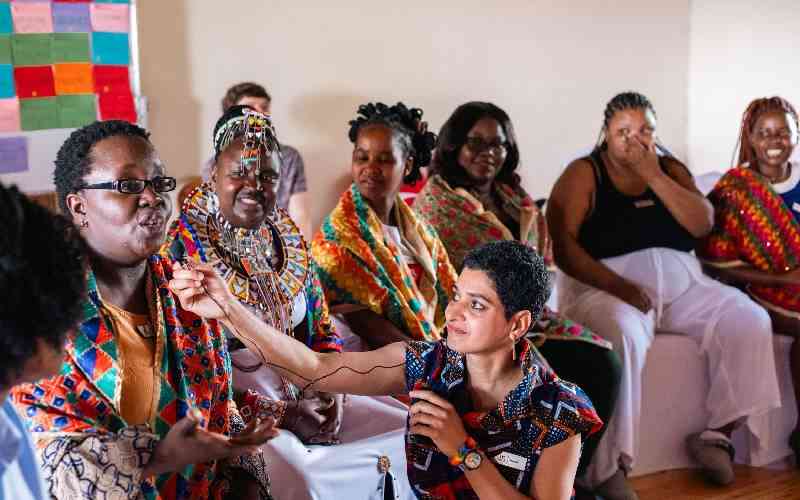George Floyd. That’s a name and face that is going to live in our minds - and collective conscience - for many years to come.
And in this age where we have information at our fingertips, our children have seen the image of a black man being killed, in broad daylight, because of his colour.
Some of our children get what the universal outrage is all about. Others don’t, maybe because they are too young. Or because, when their heads are buried in their gadgets, they are more taken in by the entertainment offering than by current affairs.
I hope that as Kenyan parents, we won’t let this moment go by without teaching our children to stand up against injustice at home and in school.
Our children are smart. They can see right through us, and our indifference and hypocrisy.
Take my daughter, for instance. If I tell her to speak up against the unjust treatment of a classmate, she will bring up my past records, if any, when I stood and watched a wrong being perpetrated.
Sometime last year, a number of her classmates, who had school fees arrears, were denied the opportunity to do exams.
Instead, they were locked in an empty classroom, as their peers did the exams.
When push comes to shove
“I felt so bad,” Pudd’ng confessed, asking me what we could do about it, so that pupils who studied were not denied the chance to excel.
“I’ll see what I can do. Maybe, I’ll speak to the teachers. They can allow the kids to do the exams, and ... I don’t know ... find a way to get the money from the parents, without making the children to suffer.”
This issue bothered me, but I felt powerless. Some mornings, when I walked my daughter to school, she’d ask me if I would speak to her teacher.
One day, push came to shove. Baby girl pushed me to do what I’d been promising her that I would do. It was toward the end of last year.
Parents of Class Seven pupils were called to the school to go and help their children, who would be promoted to Class Eight, to choose high schools. The exercise went on smoothly.
Then it came to the Q&A session. Parents raised all manner of issues. All the while, Pudd’ng kept looking me like; “Dad, I believe you have something to say”.
Stay informed. Subscribe to our newsletter
When Pudd’ng saw that I wasn’t budging, she started taking my hand, like she wanted to raise it up. That looks bad on a grown-up man. It looks like you are a wimpy.
I finally spoke to the teachers about this issue that had been nagging my daughter. The teachers agreed that, now that they knew better, they would do better. The smile on my daughter’s face was priceless.
Speaking truth to power
This taught me that - though we may feel like the one little humming bird in Prof Wangari Maathai’s famous anecdote - our children believe we are powerful. They believe we can change the world.
And when we take our children at their word, and stand up and voice our concerns, we are teaching them to speak truth to power.
Most of the “fights” for justice, which we teach our children about human dignity, will not even get fillers in newspapers. They’ll go unnoticed. It’s in how we treat neighbours who may, for instance, be facing the threat of eviction and have nowhere else to go, and nobody to turn to.
It’s not enough for us to be just outraged at the murder of George Floyd, and turn a blind eye -- even hurl tribal epithets -- when we see images on TV of a Kenyan being physically abused by police.
Our children are watching us. They will not become who we tell them to be; but who we are modelling. If we stand up for justice, regardless of tribal or political affiliations, so will they, in due time. If we retreat to our cocoons, they’ll be crouched right behind us.
Knowing that Pudd’ng’s watching my every move and utterance always keeps me on my toes.
 The Standard Group Plc is a
multi-media organization with investments in media platforms spanning newspaper
print operations, television, radio broadcasting, digital and online services. The
Standard Group is recognized as a leading multi-media house in Kenya with a key
influence in matters of national and international interest.
The Standard Group Plc is a
multi-media organization with investments in media platforms spanning newspaper
print operations, television, radio broadcasting, digital and online services. The
Standard Group is recognized as a leading multi-media house in Kenya with a key
influence in matters of national and international interest.
 The Standard Group Plc is a
multi-media organization with investments in media platforms spanning newspaper
print operations, television, radio broadcasting, digital and online services. The
Standard Group is recognized as a leading multi-media house in Kenya with a key
influence in matters of national and international interest.
The Standard Group Plc is a
multi-media organization with investments in media platforms spanning newspaper
print operations, television, radio broadcasting, digital and online services. The
Standard Group is recognized as a leading multi-media house in Kenya with a key
influence in matters of national and international interest.






